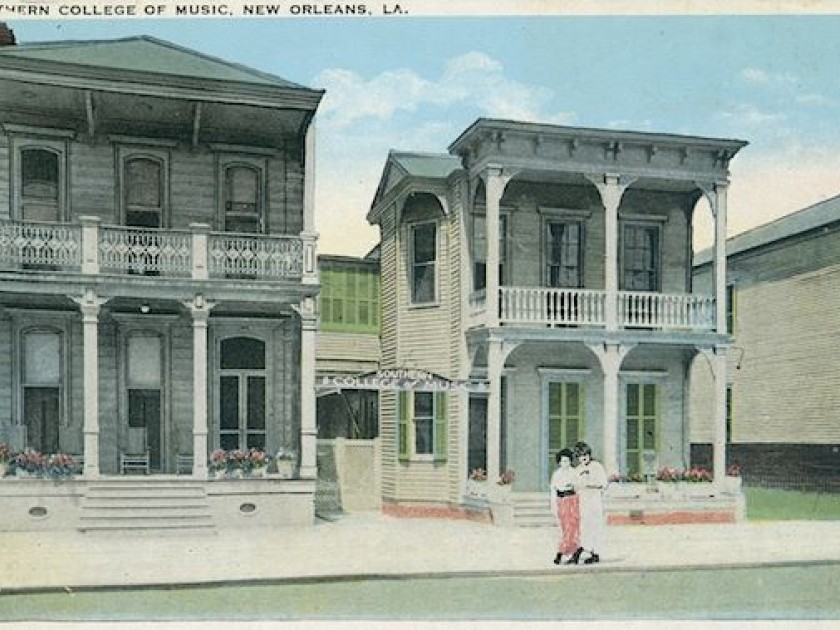
Southern College of Music New Orleans Postcard, 1900s
Every novel has at least one backstory. In the case of The Dressmakers of Prospect Heights, I had two distinct stories in mind, and my challenge was to find a way to weave them together, as if I were braiding challah.
The first of these takes place in New Orleans, a setting that is central to the background of Beatrice Carr, one of the novel’s main characters. I first visited the city in 1988 and fell instantly in love. The look of it, the mélange of cultures — Southern, French, Spanish — the food, music, and history all contributed to its appeal. After that trip, New Orleans was on my radar. So when I came upon the book Empire of Sin by Gary Krist, I dove right in. It was from Krist that I learned about Storyville, or The District as it was also called — a designated area in which prostitution was legal during the years between 1898 and 1917. In fact, it was not only legal, but on full and lavish display: Basin Street, situated across from the railroad station, was lined with brothels, each more opulent than the next. Their owners — often women — became celebrities of the demimonde, a class associated with men who wielded influence and power. Prostitution was a huge business that in turn helped fuel other businesses, since hundreds of musicians, cooks, waiters, and servants were needed to keep the wheels turning.
Widely available guides called Blue Books were designed to inform the constant influx of tourists and pleasure seekers about a vast array of city goingson. Although they were filled with ads for restaurants, cafes, and clubs, the Blue Books served chiefly as a listing of prostitutes. One of the entries read like this: Caucasian, twenty-one, Jewish. Jewish! This was news to me. As an Ashkenazi Jew myself, I had heard many immigration stories, stories in which those who were chased out of the old country found their way to a new one. But the story of a Jewish prostitute in New Orleans was not something I’d encountered before; and since I am a novelist, not a historian, I decided that I wanted — no, needed — to imagine my way into such a life. I set about researching, trying to make the period real in my own mind so that I could make it real in the minds of readers. I read all that I could find, looked at scores of old photographs, and made another trip to New Orleans. Soon, a character began to emerge: a young Jewish woman, far from home and cut off from family and friends, who finds herself pregnant. Dismissed from her job, and without a husband or home, she begins work in a brothel — first as a maid, later as a prostitute, and eventually as a madam with a house of her own.
The other braid of this story comes from my grandmother, Tania Brightman. She was an unhappy, difficult woman, prone to terrifying bursts of rage. She was also a troubled and even traumatized soul who did not fully understand the impact of her tragic past. Her father had been murdered, her mother attempted suicide by swallowing poison, and the Russian revolution destroyed the peace and stability of her home — and that was before she arrived in the United States and lost three of her babies, losses for which she was never able to forgive herself.
Because of her rages, I did not like her; and as I grew up, I found it easy to distance myself from her, seeing that we lived in different states. So when she died, I was wholly unprepared for the flood of grief and regret I felt. I wished I had been more patient, more understanding, more loving. Of course, it was too late to make amends with her. But writing, as I have long thought, is a form of redemption; and it was through my prose that I could reframe her story, giving her the dignity and compassion I’d withheld from her in life. And although she never became a prostitute or madam, and never even visited New Orleans, it is her spirit that animates the character of Beatrice Carr — and I can only hope I have done her justice.
Born in Chadera, Israel, Kitty Zeldis is the pseudonym for an award-winning author of eight novels and over thirty-five books for children. Her essays, articles and short fiction have been published in many national and literary publications. She is also the Fiction Editor of Lilith Magazine. Zeldis lives in Brooklyn, NY.